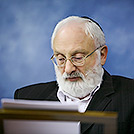Birth Instead Of Death
 The Zohar, Chapter “Chayei Sarah (The Life of Sarah),” Item 172: “And he made the camels kneel outside the city by the well of water.” “Outside the city” means in the graveyard. “By the well of water,” which precedes the revival of the dead in the graveyard. Those are the ones that negotiated in the Torah, since what is the first thing that one is asked when he goes into the grave? If he set times for the Torah, it is written, “And the stability of your times.” It is even more so when he comes out, there is no question about reviving them first.
The Zohar, Chapter “Chayei Sarah (The Life of Sarah),” Item 172: “And he made the camels kneel outside the city by the well of water.” “Outside the city” means in the graveyard. “By the well of water,” which precedes the revival of the dead in the graveyard. Those are the ones that negotiated in the Torah, since what is the first thing that one is asked when he goes into the grave? If he set times for the Torah, it is written, “And the stability of your times.” It is even more so when he comes out, there is no question about reviving them first.
A question I received: How does Torah study help a person when he goes into the grave?
My Answer: One studies the Torah and because of this he “dies” at the previous level and goes down into the “grave.” This death is required before a person renews himself and is reborn on a new level.
The desire for pleasure remains in the form of a “fetus” (Ibur) until it completes this stage and has to be born. The prior state turns into the “grave.” The mother’s womb that once comprised the whole life of the fetus, and which one knew in every detail because he grew up in it, now transforms into “the grave.” The egoistic desire that a person starts to reject and is unable to work with any longer is forced to turn itself into a new state.
This is why a person is asked: “Did you set times for study of Torah? Did you want the Light to act upon you?” Now a new state will be revealed. You applied all your efforts toward spiritual growth while staying in the mother’s womb. Now, the womb turns into the grave, and you are born with a new desire.
How else could we come to a new degree? Why can’t we just leap over the degrees? It is because we have to accumulate the desires that are associated with each prior step. By going through them, a new degree becomes obvious for us. A new degree doesn’t just descend to us from Above. One’s former desires that were previously worked on perfect themselves, thus transforming into a new level.

 Laitman.com Comments RSS Feed
Laitman.com Comments RSS Feed





What is the relationship between the Torah and the Zohar? Is the Zohar an explanation of the Torah (looking at the text in a different way ) or is the Zohar an addition to the Torah? Can one read the Zohar without reading the Torah or vice-versa)? Does this have the same effect on a person?